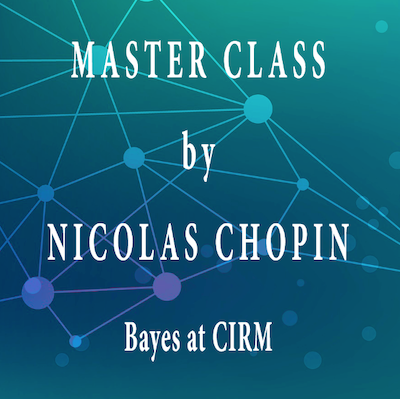Nicolas Chopin, Professor in Data Sciences / Statistics / Machine Learning
Nicolas Chopin is a Professor of Data Sciences/Statistics/Machine Learning at ENSAE Paris, Institut Polytechnique de Paris, and researcher at CREST.
He is particularly interested in all aspects of Bayesian computation, that is algorithms to perform Bayesian inference, including:
- Monte Carlo methods: particularly Sequential Monte Carlo, but also plain, quasi- and Markov chain Monte Carlo;
- Fast approximations: e.g. Expectation Propagation and variational Bayes.
Nicolas Chopin is currently an Associate editor of two journals, Annals of Statistics and Biometrika.
Last October, Nicolas Chopin was invited to give 2 Master Classes during the Autumn School in Bayesian Statistics.
Autumn School in Bayesian Statistics 2023
The objective of this autumn school is to provide a comprehensive overview of Bayesian methods for complex settings: modeling techniques, computational advances, theoretical guarantees, and practical implementation. It will include two masterclasses, on Sequential Monte Carlo and on Bayesian causal inference, tutorials on NIMBLE and on Bayesian Statistics with Python, and a selection of invited and contributed talks.
More information on the Autumn School in Bayesian Statistics 2023
Masterclass given by Nicolas Chopin on State-Space Models and SMC Algorithms
Nicolas Chopin gave a four-hour master class on state-space models and SMC algorithms (Sequential Monte Carlo, also known as particle filters) as part of the “Bayes at CIRM” autumn school, held at CIRM (CNRS permanent conference center for mathematics) from October 30 to November 3, 2023. State-space models have become very popular in recent years in all fields of application where a dynamic system is imperfectly observed, including epidemiology (modeling an epidemic such as COVID), robotics (navigation), finance (stochastic volatility), automatic language processing (grammatical function detection), and even image generation (diffusion-based methods). These models are particularly difficult to estimate. SMC algorithms have been developed over the last twenty years to meet this challenge. More recently, they have been extended to a more general class of problems and can now also be used to simulate any probability law, as effectively or even more effectively than MCMC (Markov chain Monte Carlo) algorithms.
In four hours, the master class presents an overview of all aspects of research in this field, from theory (convergence of algorithms), through the development of new algorithms and their efficient implementation in Python, to their application in different fields.
This master class is based on the speaker’s book (co-authored with Omiros Papaspiliopoulos): “An introduction to Sequential Monte Carlo” published by Springer :
https://link.springer.com/book/10.1007/978-3-030-47845-2
The master class was video-recorded and uploaded by CIRM on YouTube:
https://www.youtube.com/watch?v=0CpY1WdTkFE
https://www.youtube.com/watch?v=uuoGTBy1yH8

